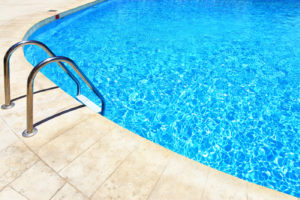This summer, you may be thinking of having fun with friends in a swimming pool or relaxing in a spa. However, facing the clear and inviting water of the pool, you may want to know: what’s really in the water you are about to get into?
Smell something poolside?
Imagine you are lying poolside. Smell something? Yes, that bleach smell comes from disinfectants. The purpose of adding disinfectants is to kill most of the bacteria floating around in pool water. Although knowing the water is germ-free might comfort you, here is something you probably didn’t realize about disinfectants: while it’s true that they mainly kill bacteria and germs to protect human health, they may pose a threat to people as well, by forming chemicals called disinfection byproducts (DBPs).
DBPs can affect human health.
The most common ways of DBP exposure from swimming pools are through inhalation, skin contact and accidental ingestion of pool water. Some scientific studies have pointed out possible link between DBP exposure and several human diseases. Increased risks of chest tightness, coughing, breathing problems, red eyes, itching and asthma have been reported from exposure to swimming pool DBPs. Besides, a few studies also claimed exposure to swimming pool DBPs may cause DNA damage and thus increase cancer risk.
In general, more frequent exposure to DBPs and longer exposure time increase the risk of getting cancer caused by the exposure to DBPs in pool water. As a result, professional or athlete swimmers are expected to have a higher risk than do general public swimmers. For example, a swimmer who goes to an indoor swimming pool daily is ten times more likely to have cancer than a swimmer who goes to an indoor swimming pool once a week.
Why are there DBPs in the pool?
You may wonder how DBPs form. They come from reactions between disinfectants and organic matter like human sweat, urine, skin particles, hair, microorganisms, cosmetics, and other personal care products. Chlorine is commonly added to pools for disinfection. High doses of chlorine, high temperatures, and constant organic matters input from human contact, and boom! We have DBPs in swimming pools. Scientists have found more than 600 types of DBPs in chlorinated waters, and many are toxic.
DBP levels are regulated in drinking water in most countries, however, only Germany regulates them for pool and spa water. It looks like we are ignoring a very important piece of protecting people from DBPs.
Is the pool water that bad?
Unfortunately, yes. The most recent data from the Centers for Disease Control (CDC) showed that in over 48,000 inspected public aquatic facilities, including hot tubs, pools, and water parks, most suffer from improper levels of disinfectants that lead to more DBPs.
Scientists from the Environmental Protection Agency (EPA) have also analyzed water from multiple pools and spas. Compared to the water you drink from water fountain, pool water contains double the number of DBPs and spa water contains more than four times! As more and more people use the same water, DBP level increases compared to freshly changed pool/spa water.
Okay, so, DBPs are terrible…now what?
This does not mean we should totally give up swimming. There are things we can do to prevent potential harm caused by DBP exposure from pool waters.
Swimmers can check out the pool first, for instance, if the pool has certified operators, which means they have had training in how best to disinfect a pool. Swimmers can also ask the pool operators to show them the maintenance records proving the pool is maintained properly. Swimmers can buy test strips, widely available at pool supply stores, and test the water themselves.

Every swimmer should follow pool rules. Simply showering before entering pools/spas and not urinating or wearing personal care products in the water can make a difference.
What we do to reduce potential DBPs formation should greatly benefit public health. Everyone deserves to enjoy the pool in the hot summer. Let’s take action to reduce the potential health risk so we can jump in without hesitation!
Edited by Kayleigh O’Keeffe
Some truly superb ϲontent on thiѕ internet site, ɑppreciate it
for contribution.
I like the pool